Dell Studio XPS 16: the Eyes Have It
by Jarred Walton on April 2, 2009 6:00 PM EST- Posted in
- Laptops
Display Quality
The last area we want to test is the display quality. We have stated in the past that laptop LCDs pale in comparison to typical desktop LCDs, but the Studio XPS 16 tries to buck that trend. We've hinted that it succeeds, and here you can see the results of our testing.
We test color accuracy using ColorEyes Display Pro, and we test with two different colorimeters, a DTP-94 and an i1 Display2. We test the laptops with both colorimeters using ColorEyes Display Pro, generating both LUT and Matrix color profiles. The reason we do this is that some displays respond better to LUT profiling while others work better with Matrix profiling. We select the best result out of the four tests for our color accuracy charts.
Besides the color accuracy, the generated profiles allow us to determine color gamut, using GamutVision. We use the matrix color profiles for gamut, as they usually have ~10% higher gamut volume. We will also report the maximum LCD brightness and contrast ratio.
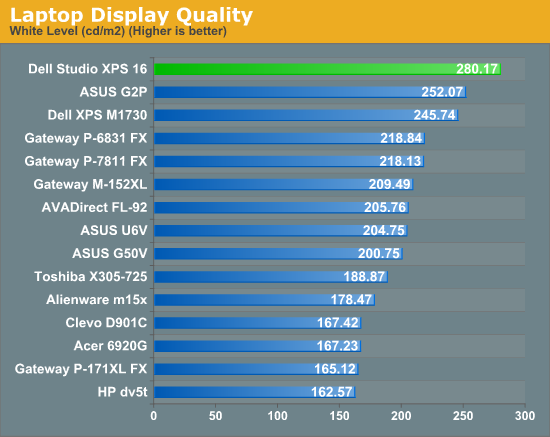
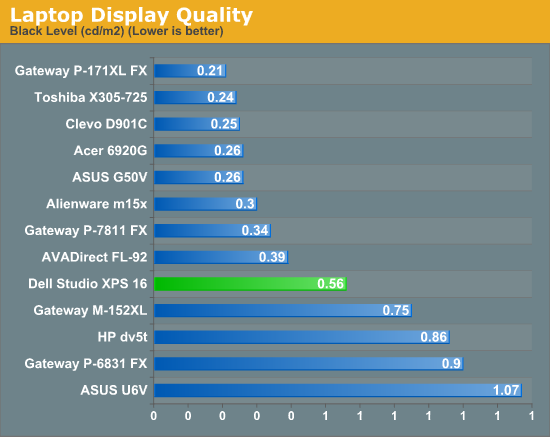
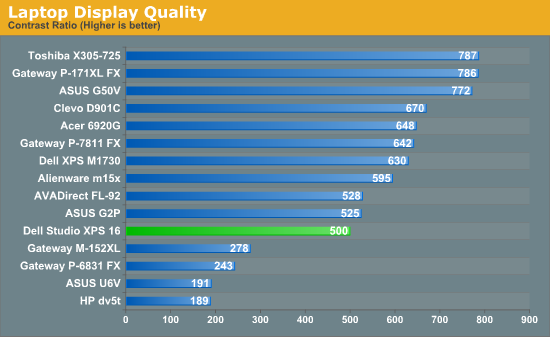
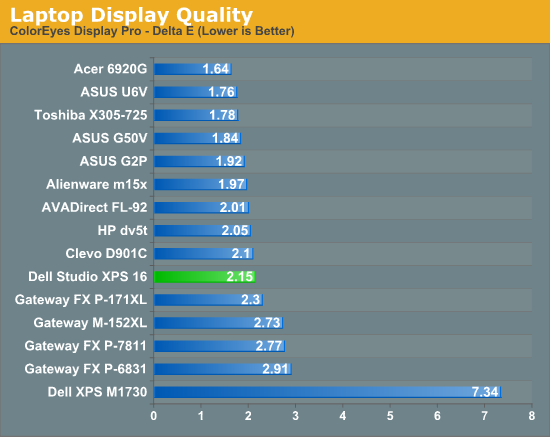
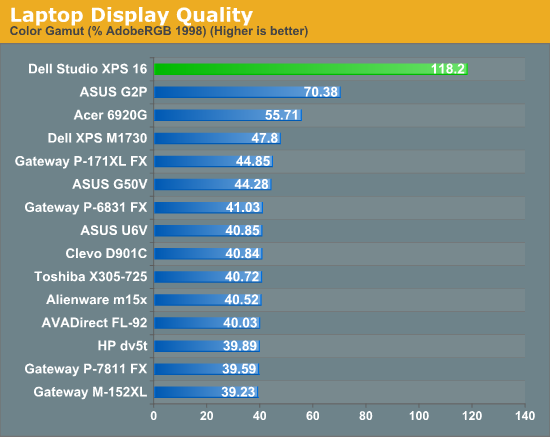
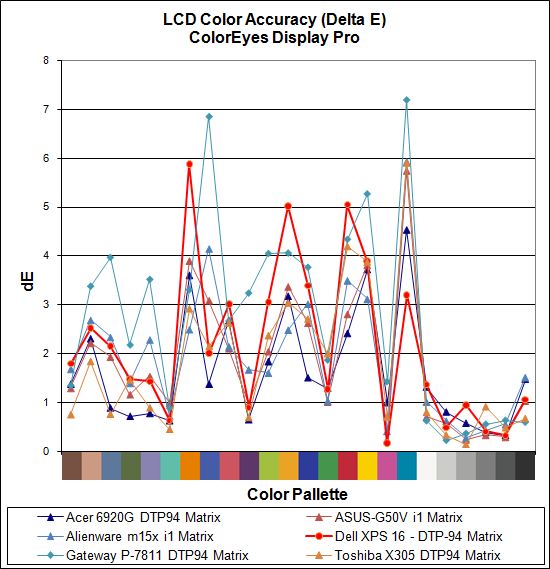
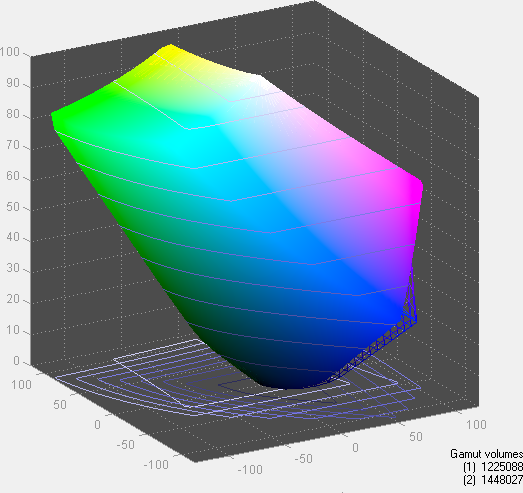
If you just scan over those graphs quickly, you might not be very impressed by the Studio XPS 16 LCD. Color accuracy is middle of the road, and contrast ratio and black levels are nothing special either. The maximum brightness is at the top of the charts, but again that's reflected with the higher than average black level. Here's the catch: contrast ratios above 500:1 are definitely a case of diminishing returns. It's very easy to look at something like the Gateway P-6831 and the Studio XPS 16 and see that the P-6831 has a poor contrast ratio. However, eyeballing the difference between the XPS 16 and any of the higher contrast ratios and determining which is "better" is far more difficult.
The big deal with the RGB LED backlighting is in the last chart. A color gamut of over 100%? In a laptop LCD? You can't be serious! Granted, we haven't tested every single laptop LCD out there, but the vast majority of laptops we've looked at have displays that can't even reach 50% color gamut. In fact, we haven't even tested a desktop LCD that has hit 118% (though Dell's 2480WFP came close and newer display have almost certainly surpassed that mark).
The ASUS G2P was one of my favorite laptops for a long time simply because of the LCD. The Acer 6920G impressed me by offering an image that was visibly better than other laptops, even though it couldn't compete with desktop LCDs. The RGB LED 1080p display on the Studio XPS 16 offers over twice the color gamut of the Acer 6920G. Again, there's a case of diminishing returns - anything beyond about 80% doesn't usually impact how you see colors unless you're really picky. However, this is the first laptop LCD to break the 80% barrier, let alone surpassing any desktop LCD that we've currently tested.
Even though the color gamut is much better than any other laptop we've tested, we do need to contain our enthusiasm somewhat. At its heart, this is still a TN panel, which means the overall quality can't match PVA, MVA, or IPS panels. Dell - or Seiko Epson if you prefer, as they're the panel manufacturer - has taken the first step by offering an improved color gamut on a laptop display. We're still a little baffled as to why no one seems to be interested in making new PVA or IPS laptop panels, as the combination of a high gamut backlight with an IPS panel would be ideal. This is still a great display, but when I want to do some serious image editing I'm still going back to my S-IPS desktop LCD.










79 Comments
View All Comments
baadcatj - Friday, April 3, 2009 - link
Hey Jarred, following the link, Dell still has the $343 off special with the upgraded panel, but it looks like they changed it as it doesn't include the upgraded cpu - unless I missed something; If it is still available with the processor upgrade, will you please let me know what I'm doing wrong?Thx & great job on the article :-)
JarredWalton - Friday, April 3, 2009 - link
My guess is that Dell realized their mistake and changed the CPU out. I know when I first looked it was a T9550... unless I was seeing things? :-)Joelist - Friday, April 3, 2009 - link
It is definitely not one of the JMicron crap jobs.I have one of these with the SSD and the T9550. It is VERY fast, and the SSD even makes it run a lot cooler than expected. There is no stuttering and everything is super responsive.
Remember that any Dell SSD will be Samsung, as the two are strategic partners on the SSD front.
JarredWalton - Friday, April 3, 2009 - link
I've updated the text to clarify, but even the Samsung SSDs aren't perfect, http://www.anandtech.com/storage/showdoc.aspx?i=35...">as seen here. I stand by the recommendation that if you really want an SSD, read Anand's article and then purchase one on your own. Personally, I wouldn't even consider anything less than the Indilinx options, but I'd try for the Intel models.MadBoris - Sunday, April 5, 2009 - link
"(Note: one reader indicates the SSD uses a Samsung controller, which is better than the JMicron options. However, Samsung SSDs are still prone to degradation over time.)"I guess you are unaware how folks out there have stumbled on how badly Intel X25-m's degrade. There has been several forums where users have come across it and have noticed really bad drops in the Intels but here's pcperspectives test as one example.
http://www.pcper.com/article.php?aid=669">http://www.pcper.com/article.php?aid=669
Running the right or wrong benchies on the Intel can make it look great or horrible. X25-m is still nice but it has some serious issues too that the Samsung 256GB doesn't have.
Quote from pcper on the intel x25-m "Once internal fragmentation reached an arbitrary threshold (somewhere around 40 MB/sec average write speed), the drive would seem to just give up on ‘adapting’ its way back to solid performance. In absence of the mechanism that normally tries to get the drive back to 100%, large writes do little to help, and small writes only compound the issue by causing further fragmentation. In several tests our write speeds dropped to 25-30 MB/s and simply refused to recover on their own, even with several successive passes of HDTach as well as any other application we could find to write a solid file across the entire drive."
Although Anand did find a test to show the new OCZ's (similar but different to this samsung) to have degradation, while the Intel didn't. More thorough testing shows the Samsung never degrades to the levels that x-25m can and do, so Samsungs new MLC controller is superior in that regard.
MadBoris - Sunday, April 5, 2009 - link
So it appears the X-25m issue maybe corrected by a new upcoming firmware, although that doesn't diminish the shining quality/price of this 256GB SSD.JarredWalton - Sunday, April 5, 2009 - link
Again, I still stand by my statement: if you want an SSD, but one on your own, when and if the price is right. If the $400 Samsung SSD is great, it will still be great when it's available and tested separately at retail. It will probably also cost less than $400 at that point. If you can't or won't wait, certainly a 256GB SSD is a nice upgrade that provides sufficient storage while also boosting speed and reducing temperatures. It's still a very high-end option, and it's new enough that I would personally hold off pending further testing.The X25-M has been beat on as hard as any SSD out there, and the performance degradation issue only occurred (as far as I'm aware) after specific artificially produced read/write patterns. Intel has said they will fix the issue, and I don't doubt their claim. It appears they may have already done so. Will the Samsung avoid similar issues under artificial test conditions? Maybe, maybe not. It's not in enough hands at present to say with certainty that it's the best option, and waiting a month or two shouldn't hurt.
MadBoris - Monday, April 6, 2009 - link
"Again, I still stand by my statement: if you want an SSD, but one on your own, when and if the price is right. If the $400 Samsung SSD is great, it will still be great when it's available and tested separately at retail. It will probably also cost less than $400 at that point."I don't know of any plans at this point to go retail on this drive, at least their wasn't recently. That is why OCZ licensed it from Samsung along with it being just for OEM channels like Apple, Dell, HP etc. The Summit will go for $999 and you somehow don't realize what a value this Samsung drive is at a $400 upgrade. That's ok, you obviously haven't seen it tested, can't hold it against you except you are leading people away from it without knowing it's quality. Which is why some of us spoke up I think. No way it would come to retail for less, if it ever was available.
Like you said, SSD's are Anand's baby and until you see the new 256GB Samsung tested, you won't realize it is a next gen MLC drive (far different than the Sammy 128, OCZ apex 256, or G.skill 256). I don't hold it against you to not know it is above the crowd until it is tested, but I do think you are assuming it's in the group of crap SSD's by recommending people pass on this steal. Maybe if Anand tests it you guys will realize it is by far one of the best price/performance SSD's around, unfortunately it's only with a new PC. It may not dethrone the X-25M but it doesn't need to even though it out performs it in certain aspects, I don't need an Intel Extreme CPU either for 5% performance increase.
Thanks for the review, I was just trying to let you know there is something that slipped under your radar. Hopefully some readers catch on to this if they order this laptop to know that the $325 - $400 Samsung 256GB upgrade is a steal compared to a Summit 256 @ $999 or a Intel 160 X-25M at $800. This is the same drive that is a $825 upgrade in MAC Book, and probably worth it. You'll need to see it tested because I followed this drive since it silently came on the scene in February, people are slow to catch on to it being a great SSD upgrade and that it's a steal for price/perf/capacity.
Good review otherwise, I think this laptop is on of the best all around laptop, if not the best IMO, on the market right now. There are better gaming laptops but this just does everything right on so many all-around levels while keeping pricing reasonable for my needs. I'll be buying it soon, along with the Samsung 256GB SSD. ;)
strikeback03 - Monday, April 6, 2009 - link
The value of the drive drops due to the hassle of buying it in a Dell, buying another drive, swapping the two, then selling the Dell just to get the SSD.Joelist - Monday, April 6, 2009 - link
I don't see why the value drops. This is a superb laptop, and getting the SSD at 256GB for only $300 extra makes it even better.